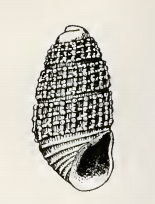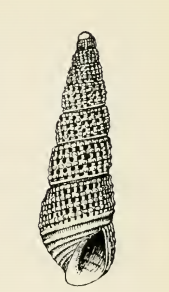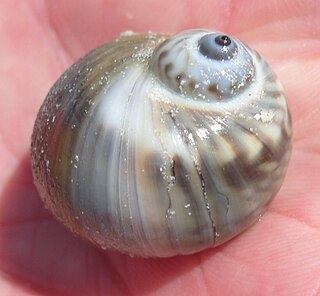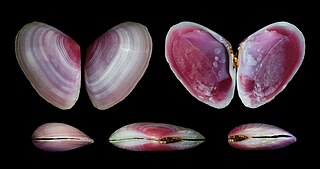
Tellina is a widely distributed genus of marine bivalve molluscs, in the family Tellinidae.

Fabulina fabula, the bean-like tellin, is a species of marine bivalve mollusc in the family Tellinidae. It is found off the coasts of northwest Europe, where it lives buried in sandy sediments.

Tellina tenuis, the thin tellin, is a species of marine bivalve mollusc in the family Tellinidae. It is found off the coasts of northwest Europe and in the Mediterranean Sea, where it lives buried in sandy sediments.

Abra alba, or the white furrow shell, is a species of bivalve mollusc in the family Semelidae. It occurs in the northeastern Atlantic Ocean and the Mediterranean Sea, where it lives on the floor in shallow areas buried in soft sediments.

Odostomia clathratula is a species of sea snail, a marine gastropod mollusc in the family Pyramidellidae, the pyrams and their allies.

Odostomia inconspicua is a species of sea snail, a marine gastropod mollusc in the family Pyramidellidae, the pyrams and their allies.

Odostomia paupercula is a species of sea snail, a marine gastropod mollusc in the family Pyramidellidae, the pyrams and their allies.

Odostomia terebellum is a species of sea snail, a marine gastropod mollusc in the family Pyramidellidae, the pyrams and their allies.
Turbonilla major is a species of sea snail, a marine gastropod mollusk in the family Pyramidellidae, the pyrams and their allies.
Diodora alta is a species of sea snail, a marine gastropod mollusk in the family Fissurellidae, the keyhole limpets and slit limpets.

Sanguinolaria tellinoides is a species of saltwater clam, marine bivalve molluscs of the family Psammobiidae.

Dosinia dunkeri is a species of saltwater clam, a marine bivalve mollusc in the family Veneridae.

Pinctada mazatlanica is a species of tropical marine bivalve mollusc in the family Pteriidae, the pearl oysters. It is known by the English common names pearl oyster, Mazatlan pearl oyster, and Panama pearl oyster. Spanish common names include madre perla, and ostra perlifera panameña. This mollusc was first described to science in 1856 by conchologist Sylvannus Charles Thorp Hanley. Pinctada mazatlanica produces gem-quality pearls and was the basis of a pearling industry in the Gulf of California for centuries.
Acteocina infrequens, common name the Magdalena barrel bubble, is a species of small sea snail, a marine opisthobranch gastropod mollusk in the family Acteocinidae, the barrel bubble snails.

Modiolus capax, common name fat horsemussel, is a species of "horse mussel", a marine bivalve mollusc in the family Mytilidae, the mussels. It was first described to science by American malacologist Timothy Abbott Conrad in 1837. The type specimen was collected in San Diego by Thomas Nuttall.

Tellina radiata, common name sunrise tellin, is a species of bivalve mollusc in the family Tellinidae, the tellins.

Codakia distinguenda, the elegant lucine, is a species of marine bivalve mollusc. It was first described to science in 1872 by George Washington Tryon Jr.

Notocochlis chemnitzii, or Chemnitz' moon snail, is a species of gastropod mollusc. It was first described to science in 1840 by Ludwig Karl Georg Pfieffer. The animal is likely named after conchologist Johann Hieronymus Chemnitz.

Megapitaria squalida, the chocolate clam, is a species of bivalve mollusc in the family Veneridae. It was first described to science by George Brettingham Sowerby, a British conchologist, in 1835. The type specimen was collected by Hugh Cuming.

Eurytellina is a genus of bivalves belonging to the family Tellinidae.

















